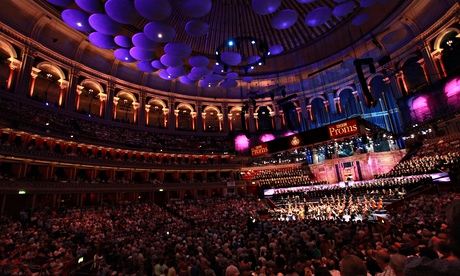
Since 1927, when the BBC took over the Henry Wood promenade concerts, the Proms have been Britain's most important champion of new music, commissioning countless works from composers that have been experienced by an enthusiastic and open-minded audience that, in the words of Sir Harrison Birtwistle, is "in for anything".
But this year, those watching selected Proms on BBC2 and BBC4 have been confronted by a mystery: the case of the disappearing contemporary music.
Prominent figures from the classical music world have united to condemn the excision of new music from the televised Proms. Susanna Eastburn, the chief executive of Sound and Music, the national agency for new music, said it was "a policy-by-implication which assumes that audiences won't like new music, and that it's not valued by the BBC".
Composers whose works were edited out of the televised versions of the Proms include Birtwistle, Jonathan Dove, Helen Grime, Roxanna Panufnik and John McLeod.
The new master of the Queen's music, Judith Weir – music's equivalent of the poet laureate – spoke out against the removal of the works. "This looks like a policy, and it is so sad." She said that by not televising the works the BBC was guilty of "ghettoisation" of contemporary music.
"It seems such an old-fashioned decision: there is a new spirit abroad," she said, arguing that there was a surge in young, talented composers of, and audiences for, contemporary music in Britain. "I feel that the BBC should trust people who have already taken the step of watching an orchestra on television."The decision was, she added, out of step with the great commitment the BBC makes to new music generally.
Fellow composer James MacMillan said there was "widespread shock among composers, publishers and performers that this is happening". He referred to his "seminal experiences" watching music by composers such as Britten and Sir Peter Maxwell Davies as a child on TV. "Is the BBC now making new music less available than before? The implications are tragic,
" he said.
Grime's piece Near Midnight was the only one cut from the televised version of the Prom in which it had appeared. The concert was given by the Hallé under Sir Mark Elder, and included works by Beethoven, Berlioz and Elgar.
Though Grime's work is available to watch on iPlayer, she said she was "really disappointed and quite angry … it feels as if you have been put on one side and treated quite badly. For the Proms – the most important music festival in the world – to be setting an example like this is terrible. It's patronising to the audience to assume that people are going to switch off." She cited the positive response she had received when a previous work had been televised from the Proms in 2009.
Birtwistle's three-minute Sonance Severance (2000) was not included in Friday night's televised version of the National Youth Orchestra's Prom, though it was available to watch online and is due to be included in a special programme celebrating both his and Maxwell Davies's 80th birthdays on 11 September.
"I don't care, it's their loss," said Birtwistle, branding the BBC's explanation for its removal from the main broadcast as "crap". "I'm not surprised," he said. "I said before: 'I bet they don't play my piece.' That's what you get with the televisual … It shouldn't be like this, but I've had it all my life; that's why I'm not surprised." He added that BBC Radio 3 was an important supporter of his music.
Dove's work Gaia Theory was commissioned by the BBC but then dropped from the televised version of the BBC Symphony Orchestra's concert, which also contained works by Ravel and Mozart. He said: "It is disappointing – because it means the chance of picking up a new audience for the music is removed. I write music that is approachable, and it's not intended for a ghetto, it's intended for people who like music." Even assuming the decision was made because of fears audiences would switch off unfamiliar music, he said: "It is not clear to me why a public service broadcaster should be chasing ratings."
A BBC spokeswoman said: "Putting the Proms on television inevitably involves an element of editorialising … Sometimes, for various reasons – most notably scheduling – we have to omit certain works from the broadcasts. This has always been the case with the Proms on television. In making those choices, the Proms team and the commissioning editor have to bear in mind the audience and that newer works are often less familiar to them."
She pointed out that some composers such as Gabriel Prokofiev had been included in televised Proms, and that the BBC had created an online collection of new works from the festival, available for 30 days on the iPlayer. The BBC was devoting an evening to the work of Birtwistle and Maxwell Davies, and another to that of the late John Tavener.
The spokeswoman added: "Contemporary music is absolutely not disappearing from BBC television Proms broadcasts, our commitment has increased from last year with 16 works (compared to 15) on television and a further eight works on iplayer as part of a new music collection which is available for a longer 30 days." BBC Radio 3 broadcasts every Proms concert live and complete.

